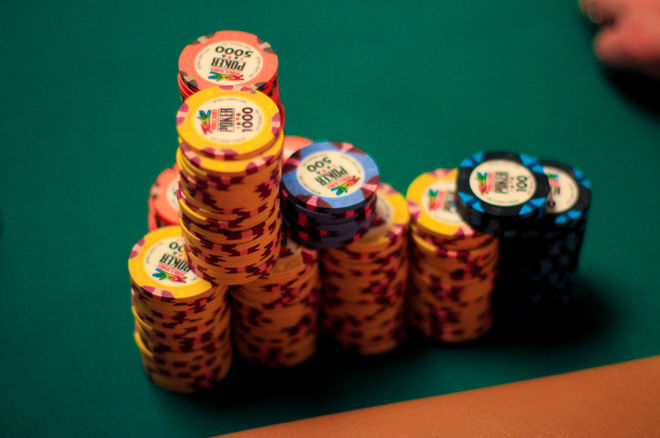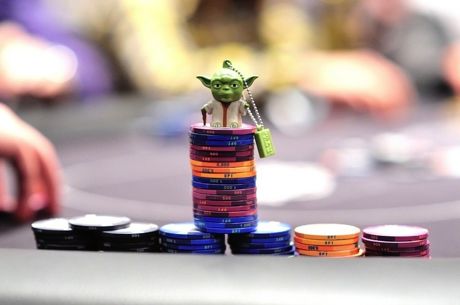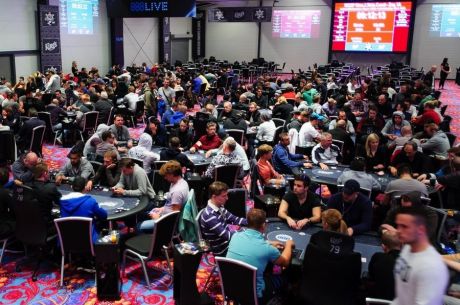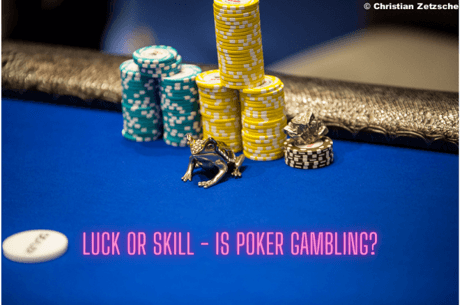Learning How to Win: Different Types of "Positive Tilt"

Have you ever won a hand you didn't deserve to win? No... of course not. We all deserve everything we get, right?
Seriously, though, if you're a thinking poker player who is knowledgeable about the game, you understand and accept the fact that sometimes we lose pots we should have won, and other times we win pots we should have lost.
You try at all times to have "the best of it" and only risk chips when you have the best chance of earning a reward for doing so. But things don't always work out that way. Sometimes we play hands poorly and win, anyway. Other times we play a hand well and still put ourselves in unfavorable positions in which we should probably lose, but get lucky and win.
When that happens — when you win a hand you know shouldn't have won — how do you handle it mentally going forward? Does it affect your decision-making at all?
How well do you handle winning in poker, generally speaking?
Gordon Vayo's Lucky Hand
The last PokerNews Podcast from the 2016 World Series of Poker (Episode #406) features commentary about the last days of the WSOP Main Event as well as interviews with the nine players who made it through the 6,737-player field to the final table scheduled to begin in late October.
One common theme brought up by nearly all of the players is how the cards tended to go their way during their tournament runs. Such is usually the case in the Main Event. The deep, slow structure tends to favor better-skilled players, but usually everyone who survives the seven-day minefield has enjoyed at least some good fortune along the way — perhaps a lot.
Gordon Vayo is one of the nine who made it, sitting in third position in chips presently. Vayo endured an emotionally challenging last couple of days of play, including dramatically winning a preflop all-in versus Jonas Lauck during the last level of Day 6 when there were just under 40 players left.
In the hand a middle-position player opened, Lauck reraised from the button, then Vayo shoved for approximately 30 BBs from the big blind. The original raiser folded, but Lauck — who had Vayo covered — called right away.
Vayo had ace-king, but Lauck had pocket aces. Vayo hadn't necessarily done anything wrong, but with the community cards still to come he was in one of the worst spots you can be preflop — only about 6% to survive the tournament.
But fortune smiled on Vayo, as the board gave him a Broadway straight and the double-up. Lauck would go out soon after in 37th, cashing for $174,826. Meanwhile Vayo would survive the night, then after a prosperous Day 7 is now guaranteed at least a $1,000,000 payday.
"I Was a Complete Basket Case"
Vayo spoke with Remko Rinkemo on the PNPod the day after play had completed. But even two days removed, the hand with Lauck was still foremost in his thoughts.
"I still am just completely floating from the ace-king against aces hand from two days ago," Vayo told Rinkema. "I still can't believe I won the hand."

Vayo then narrated the emotions he experienced immediately after winning the hand.
"When I won the ace-king versus aces, I was a complete basket case," explained Vayo. "I was just completely shook by the whole... I don't even know... somebody described it as 'positive tilt,' and I think that was a really apt description.... I couldn't even think clearly."
It's an extreme example, but what Vayo is describing is actually a common experience among poker players, I'd venture to say. You win a hand you weren't supposed to win, and the incongruity between what should have happened (probability-wise, that is) and what did happen creates a kind of weird disruption in your ability to process and move forward.
Vayo went on to talk about being at a relatively tough table and therefore being more than happy to play tight for the last hour and not have to deal with making too many decisions before they bagged up at the end of Day 6. "I was glad," he said, because "I was still in this surreal state that I couldn't even fathom that I'd won this hand in such a crucial spot in such a massive tournament."
Given a night to think over the hand and its implications, Vayo was able to transform his "positive tilt" into a genuinely positive mindset for Day 7. Understanding that he was "basically freerolling" from that point forward, he managed to play with extra calm on that final day and eventually be one of the final nine.
Types of "Positive Tilt"
The term "positive tilt" isn't a new one, and in fact has been used by others to refer to something a little different from what Vayo is actually describing.
More often, the term is used to refer to a player who after winning experiences unreasonable confidence going forward — that feeling of being unbeatable that leads to reckless, loose play and frequently results in losing back whatever had been won.
About a decade ago Alan N. Schoonmaker quoted a player describing this "common overreaction" to winning in his book Your Best Poker Friend: Increase Your Mental Edge. "When I'm running good, I go on positive tilt," said the player. "I try to run over the table with marginal hands instead of the solid ones that got me there. In addition, I slip into fancy-play-syndrome. Then, before I know it, my stack has dwindled."
Writing about the same time as Schoonmaker, Ian Taylor and Matthew Hilger described a similar kind of tilt in their book The Poker Mindset, putting it under the heading of "overconfidence." "When you are running incredibly well, you might start to overestimate your own ability," they explain. "You will start to believe you are invincible rather than correctly attribute your unusually high win rate to luck."
But Vayo is describing having a very different reaction to winning. Rather than responding to success with irrational delusions of grandeur, he's talking about being mentally flummoxed by the weird and unpredictable vagaries of fate. In fact, he describes himself becoming more cautious afterwards — not careless — smartly recognizing that his thinking wasn't as clear as he'd like.
Final Thoughts
There are a few different circumstances that can cause the type of tilt or emotional imbalance Vayo mentions. One is illustrated by his experience — winning a crucial hand in a tournament or a huge pot in a cash game when your chance of losing the hand had been very high. The pleasurable feeling that follows can be mixed with other, confusing emotions. For certain players winning a hand this way can even be tinged with a strange sense of guilt (especially if they'd played the hand poorly and still won).
A certain category of players experience something similar after building a big stack early in a tournament or after having chipped up quickly in a cash game. This, I think, is the more common type of "positive tilt" or negative caused by winning.
I explored this type of response to winning a few months ago in an article titled "Leaving to Lock Up a Win? Don't Get Up from a Good Poker Game." Robert Woolley also addressed something similar, and in fact presents an argument for why in certain situations it might be good to get up and go after winning fast and early in a cash game in "Book the Win: Advice on Breaking a Losing Streak."
In Elements of Poker, Tommy Angelo sagely observes there are three causes of tilt in poker — winning, losing, and breaking even.
We focus a lot on tilt caused by losing. We also all instinctively understand the frustrations that can come from putting in long hours and only breaking even, seemingly having nothing to show for our effort.
But tilt caused by winning — whether we call it "positive tilt" or something else — is less well understood or appreciated, I'd suggest. It's important to be able to absorb losing in poker, but being able to handle winning can be just as important.
Want to stay atop all the latest in the poker world? If so, make sure to get PokerNews updates on your social media outlets. Follow us on Twitter and find us on both Facebook and Google+!









